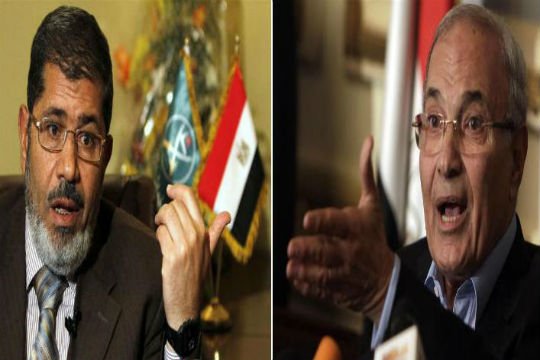
Egypt’s ruling military council has vowed to hand over power to an elected president by the end of June.
The promise comes as votes are counted after Sunday’s presidential run-off election, with both candidates claiming they are ahead in early results.
However, the council had earlier issued a declaration granting itself sweeping powers over legislation and the introduction of a new constitution.
Opposition groups condemned the declaration as a “coup”.
Lt Muhammad al-Assar from the Supreme Council of Armed Forces (SCAF) told a news conference that a ceremony would be held in late June to hand over power to the new president, state media report.
However, the constitutional declaration issued by the SCAF late on Sunday effectively gives it legislative powers, control over the budget and over who writes the permanent constitution following mass street protests that toppled Hosni Mubarak in February 2011.
It also strips the president of any authority over the army.
The SCAF have even guaranteed themselves jobs for life.
There have been no big protests so far – the military must be hoping that Egyptians are simply too tired of politics to protest, and are willing to go for stability whatever the cost, our correspondent says.
But the army’s declaration was widely condemned in opposition circles.
Prominent political figure Mohamed El Baradei has described the document as a “grave setback for democracy and revolution”.
Former presidential candidate Hamdeen Sabahi, who came third in the first round of voting and was the favored candidate of many in the protest movement, said the declaration was a “seizure of the future of Egypt”.
“We will not accept domination by any party,” Hamdeen Sabahi said.
Parliament speaker Saad al-Katatni, of the Muslim Brotherhood, said the declaration was “null and void”.
The Brotherhood had earlier urged Egyptians to “protect their revolution” after the SCAF dissolved parliament – dominated by the Brotherhood – on Saturday.
Two days earlier, the Supreme Constitutional Court ruled that last year’s legislative polls were unconstitutional because party members were allowed to contest seats in the lower house reserved for independents.
On Monday morning, soldiers prevented MPs from entering parliament.
The Muslim Brotherhood’s Mohammed Mursi ran in Sunday’s poll against Ahmed Shafiq, who served as prime minister under former President Hosni Mubarak.

The Brotherhood said Mohammed Mursi was holding a 52%-48% lead over Ahmed Shafiq with almost all the vote counted after Sunday’s second-round run-off election.
Speaking at his party headquarters, Mohammed Mursi pledged to be a president for all Egyptians, adding that he would not “seek revenge or settle scores”.
Hundreds of Mohammed Mursi’s supporters gathered in Cairo’s Tahrir Square to celebrate his declaration of victory.
But Ahmed Shafiq’s campaign said it rejected “completely” Mohammed Mursi’s victory claim, and that figures it had obtained showed Shafiq in the lead.
Official results from the Higher Presidential Election Commission (HPEC) will be announced on Thursday, state TV reported.
Correspondents say that there was less enthusiasm in the run-off election than there was for previous rounds of voting, and some called for a boycott or spoiled ballots.
Ahmed Shafiq came second to Mohammed Mursi in last month’s first round, in which turnout among the 52 million eligible voters was only 46%.
Ahmed Shafiq
• Aged 70
• Veteran fighter pilot and former air force commander
• Appointed Egypt’s first aviation minister, earning reputation for competence and efficiency
• Promoted to PM during February 2011 protests
• Associated with former regime, though denies being backed by ruling military council
• Campaigned on a promise to restore security
Mohammed Mursi
• Aged 60
• US-educated engineering professor
• Head of Muslim Brotherhood’s Freedom and Justice Party (FJP)
• Served as independent MP 2000-05
• Quietly spoken, viewed by some as lacking charisma
• Has promised “stability, security, justice and prosperity” under an Islamic banner